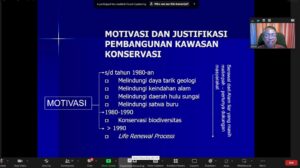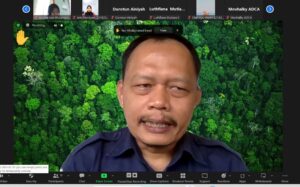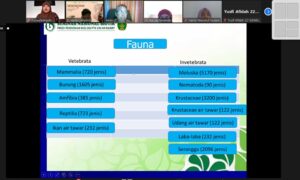 Master of Biology FMIPA Jember University and Master of Biology FMIPA Brawijaya University held a collaboration to teach biodiversity courses online (15/9). Prof. Dr. Amin Setyo Leksono from Brawijaya University, as the speaker, delivered material on animal population estimation methods. “We need an animal population approach first, both census and sampling,” he initially said. Continuing the census requires a lot of personnel to count all the flora in an area. Meanwhile, sampling can be done using direct or indirect analysis.
Master of Biology FMIPA Jember University and Master of Biology FMIPA Brawijaya University held a collaboration to teach biodiversity courses online (15/9). Prof. Dr. Amin Setyo Leksono from Brawijaya University, as the speaker, delivered material on animal population estimation methods. “We need an animal population approach first, both census and sampling,” he initially said. Continuing the census requires a lot of personnel to count all the flora in an area. Meanwhile, sampling can be done using direct or indirect analysis.
Prof. Amin continued direct sampling itself, divided into several methods. “There are quadratic methods, transect lines, exploration and exclusion methods, and finally we have to calculate the population size,” he continued. For indirect methods, there are several methods, including traps, concentration calculations, trace counts, and interview methods. The conclusion from the initial session was that the benefit of animal estimation is knowing population dynamics patterns, including influencing factors. “We come to know the potential of each type, its role and benefits, and finally, what policies to take for this population,” he concluded.
In the next session, Prof. Amin conveyed the conservation planning and conservation area management strategies. At the start of online lecture, participants were given an understanding of the meaning of management, areas, conservation, and the laws governing biodiversity conservation. “Conservation is the management of air, water, land, minerals, and living organisms, including humans, to achieve an improved quality of human life,” he explained.
Management goals and objectives are also explained. The goal includes the overall target, namely the preservation of all regional functions. “The targets are ecological and environmental sustainability and social and economic sustainability,” continued Prof. Amen. At the end, the material was also presented on sustainable development and invited participants to be wise in using natural resources, participating in reforestation, recycling waste, and saving energy and water. “Take part in conservation actions, be involved in research and community service, and understand regulations so you can speak up about inappropriate implementation,” he concluded..


